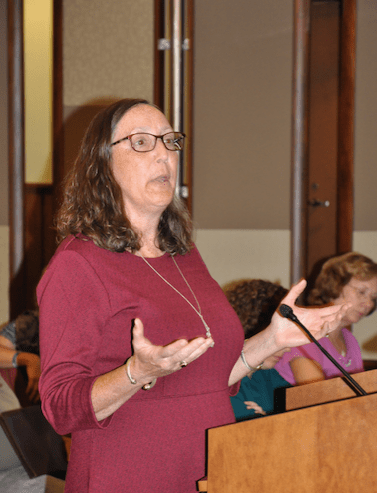Twenty-one oppose ACP permit
Published 2:06 pm Tuesday, October 18, 2016

- JORDAN MILES | HERALD Landowner Irene Ellis Leech speaks in opposition to the proposed Atlantic Coast Pipeline and compressor station.
Twenty-one of 23 people who spoke during a continued public hearing Monday night regarding the proposed Atlantic Coast Pipeline (ACP) project and a connected compressor station opposed the issuance of a special use permit.
The remaining two speakers said the project and station would be good for Buckingham County.
The permit in question is for the proposed 53,515 horsepower (hp) natural gas fired compressor station. The 21 people opposing the permit cited health concerns, noise affects, air and water pollution and Dominion offering inaccurate information.

JORDAN MILES | HERALD
Dhyani Simonini, left, Evelyn Dent, and Heidi Berthoud, right, sing and play instruments celebrating the earth’s natural resources before the commission’s hearing.
Trending
The public hearing began during the Buckingham Planning Commission’s Sept. 26 meeting, where 28 people vigorously opposed and scrutinized the project. Even more people wanted to speak, leading to the commission’s decision to split the hearing into two parts, with the second half taking place Monday night. On Sept. 26, opponents asked the commission to deny the permit.
The Rev. Fillmer Hevener, of Buckingham, and John Arsenault, of Prince Edward, were the only two people who spoke Monday night in favor of the Dominion-led pipeline project, which, if approved by federal regulators, would result in a 600-mile natural gas pipeline being laid from West Virginia, spanning Virginia, into North Carolina. A portion of the 42-inch pipeline would span Buckingham County.
Hevener said benefits the station and pipeline would bring to the county could include increased tax revenues and “clean, abundant energy for consumers.” Arsenault, citing his support for the project, detailed his experience with oil and gas pipelines.
However, opponents, including Joe Anthony, said, “The costs outweigh the benefits.” Georgeanna Stinnett, who said her family has lived in Buckingham for eight generations, said Dominion is “notorious” for breaking and bending rules.
If approved, the station, which would help transport natural gas down the line, would be located on Route 56 between Union Hill and Shelton Store roads.
David Wade Ball told commissioners granting permit approval now would “be in haste.”
Trending
Landowner Irene Ellis Leech called the compressor station a “point pollution facility.”
“As a farmer, I’m worried about what this compression station is going to do to us down the road,” Leech said, adding that she is worried about her family farm’s crops and animals.
Chris Arbo, whose daughter suffers from respiratory illnesses, told commissioners the project made her “very upset,” citing potential health impacts from the station.
“This is a corporate action,” Walter E. “Wes” Saxon Jr. said, claiming the presence of a natural gas pipeline would not bring more business to the county. Saxon’s biggest concerns were the limited liability company the energy companies formed for the ACP, noise, air pollution and security.
A recommendation from commissioners to the county’s board of supervisors, which has the final say on the permit, could come next Monday during the commission’s 7 p.m. meeting. The commission agreed to meet with Dominion for final questions at 6 p.m. before the regular meeting.
In a presentation in September, Dominion representative Carla Picard focused on safety, air quality, noise abatement and compatibility with surrounding uses and conformance to the county’s Comprehensive Plan, claiming safety is the company’s No. 1 priority. She claimed the energy firm complies and, in most cases, exceeds requirements set forth by the federal government. Picard said the facility would be equipped with an emergency shutdown system and be remotely controlled 24/7 by a gas control center and remote-controlled shut-off valves.
“The (state) permit levels are calculated at the maximum possible operating conditions,” Picard said of air emissions from the facility. “Of course, what actually happens day to day would be lower than that.”
The commission has placed 32 conditions on the permit — which could be amended.





